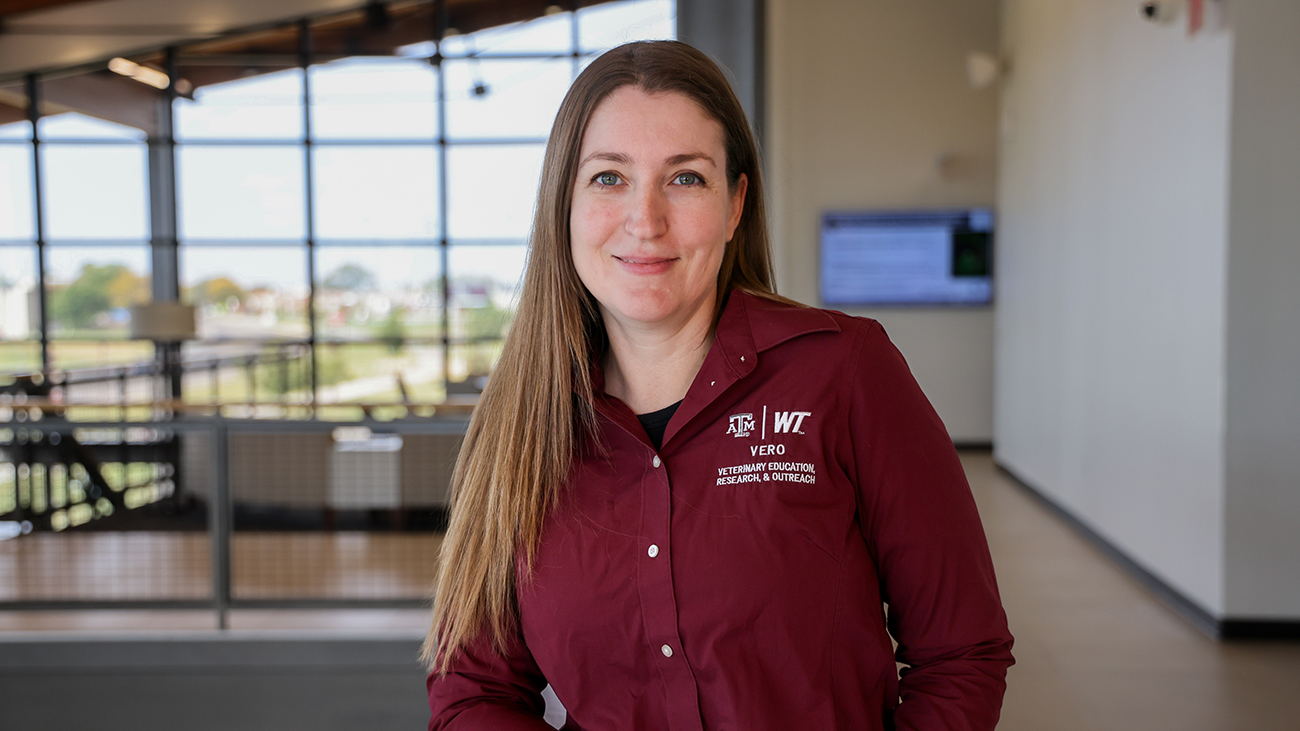- Featured
- Agriculture
A New Era for Bovine Health: Specialist Joins Texas A&M’s VERO Campus
CANYON, Texas — Dr. Cassidy Klima, an expert in bovine health and antimicrobial resistance, is bringing her expertise to Texas A&M as a joint faculty member of the Texas A&M AgriLife Research at Amarillo and the College of Veterinary Medicine & Biomedical Sciences’ (VMBS) Veterinary Education, Research, & Outreach (VERO) program in Canyon.
As VERO’s newest veterinary educator and researcher, Klima hopes to contribute to the program’s growth and impact by advancing innovative research in bovine health, fostering strong industry-academic collaborations, and mentoring the next generation of veterinary scientists.
Canadian RootsAfter earning her bachelor’s degree in biological sciences from the University of Lethbridge in Alberta, Canada, Klima remained at the institution to complete her master’s degree in the same field. She then pursued a Ph.D. at the University of Saskatchewan, where her passion for cattle health research began to take shape.
While working on her doctorate, Klima gained valuable experience at the Agriculture & Agri-Food Canada Research Institution. There, she focused on comparing the genetic information of various organisms to identify effective vaccine components aimed at strengthening cattle’s defenses against Bovine Respiratory Disease.
“At Agriculture and Agri-Food, a mentor provided me with opportunities to get involved in cattle research,” Klima said. “That’s how I transitioned into the field, which felt like a natural fit given my family’s ranching and farming background.”
After earning her Ph.D., Klima expanded her expertise through a postdoctoral fellowship at the University of Calgary, where she investigated how bacteria in cattle develop resistance to antibiotics, and a research scientist position at Feedlot Health Management Services, where she conducted research aimed at improving cattle health and welfare.
Outside of beef cattle research, Klima has also studied antimicrobial resistance in chickens for a second postdoctoral fellowship at Iowa State University and has helped improve trade and policies for the beef cattle industry as a technical director for the Beef Cattle Research Council and Canadian Cattlemen’s Association.
Klima’s career – shaped by a blend of academia, mentorship, research, and industry experience – has equipped her with a diverse skill set spanning microbiology, food safety, production policy, and animal health. This breadth of expertise underscores her commitment to addressing livestock-related health challenges and is something she now brings to her role at Texas A&M.
Although Klima hails from Alberta, Canada, her transition to life in Canyon felt familiar.
“Lethbridge, Alberta, is the heart of Canada’s cattle country,” Klima said. “It’s pretty much the equivalent of Canyon, Texas, in that sense.”
Advancing Bovine Health
As an assistant professor in the VMBS’ Department of Veterinary Pathobiology (VTPB), Klima plans to focus on bovine health, specifically antimicrobial resistance, food safety, and fighting the microbes that cause respiratory disease in cattle.
“My goal is to build a research program that makes a real difference at the production level,” Klima said. “I want to tackle some of the hard questions in bovine health that we’ve struggled to answer while using the latest technologies that are now becoming available.”
Klima’s unique dual appointment with VERO and AgriLife Research in Amarillo broadens her research horizons. She looks forward to engaging actively with Texas A&M AgriLife’s researchers and their committees to integrate her work across sectors.
“Texas A&M AgriLife’s connection to industry, academia, and government is crucial for finding impactful solutions and securing research funding,” Klima said. “They offer a perspective on where our work can make the most difference, beyond just academia.”
Nurturing Tomorrow’s Leaders
A core aspect of Klima’s teaching philosophy is her emphasis on mentorship over traditional textbook learning.
“Students are the foundation of the future,” Klima explained. “My focus is on mentoring and helping them develop diverse skills that can’t be learned from books alone. It’s about building character and resilience, which are crucial in the scientific field.”
Klima believes that the supportive environment at VERO, where professors genuinely invest in their peers' growth, enhances student learning experiences. She hopes to elevate VERO’s reputation, ensuring that students recognize the value of coming to Canyon to be part of the unique community.
“When professors are committed to your growth beyond just academic tasks, it transforms the student experience,” Klima said. “I want to help grow VERO’s reputation as a unique opportunity where students receive a level of personal investment that isn’t easily found in other programs.”
Klima’s collaborative approach aligns seamlessly with VERO’s team-oriented culture. She is excited to join a group of researchers who, despite working in similar fields, each bring unique perspectives and problem-solving techniques.
“At VERO, the focus is on synergy,” Klima said. “Our focus is on community, building relationships, and seeking opportunities to collaborate. While many of us have similar interests in topics important to production and animal health, our unique paths have equipped us with different skill sets and perspectives – this diversity strengthens our collective efforts.”
Looking Forward
Although she is just a month into her new role, Klima is optimistic about the future. She plans to continue her work on antimicrobial resistance, mobile genetic elements, and overall animal health initiatives while remaining open to evolving research directions.
“I’d love to tell you exactly what I’ll be working on in five years, but research is like a river – it often takes you in unexpected directions,” Klima said. “Of course much of what I initially focus on will center around improving animal health and production efficiencies, but I suspect that in the coming months, my opportunities will expand as I connect with more people, explore new funding avenues, and align with the evolving priorities of different groups.”

